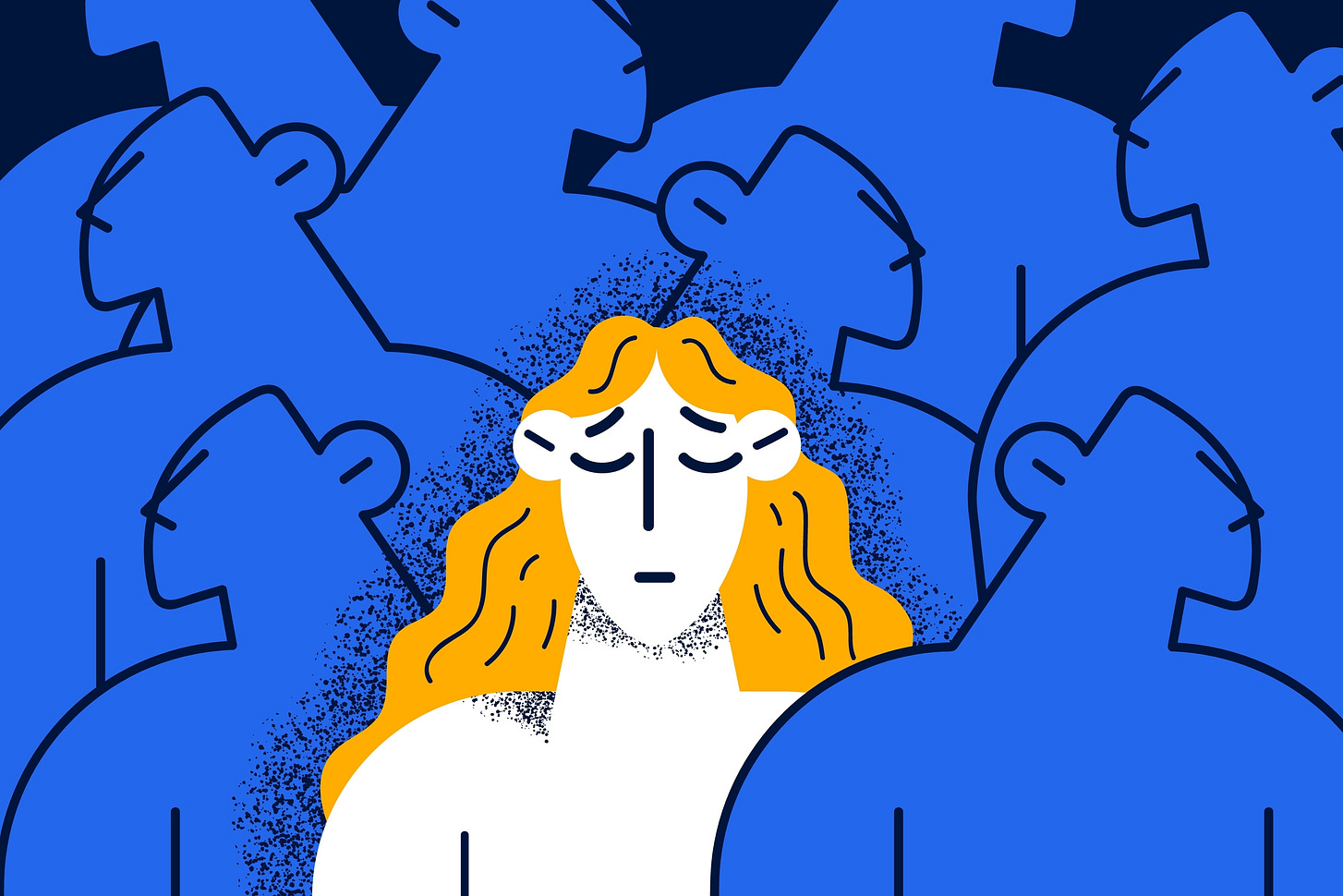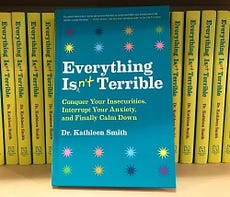Happy Tuesday! Excited to let you know that the preorder bonus for my upcoming book, True to You, is finally available. The amazing folks at St. Martin’s set up a page for you to enter your order info and immediately download the companion workbook + a sneak peek of a chapter from the book. (Yes, it’s the chapter on overfunctioning.) So this is me, asking you to preorder my book. More preorders = more retailers order it for their store = more people buy it. Also, the First Friday Q&A for paid subscribers is this Friday. You can email me your question at kathleensmithwrites@gmail.com or drop an anonymous question here. If you’re a new subscriber, you can access the entire archive of my newsletter here. Continued thanks to all 11,000+ of you for being on this ride. It is a real gift to get to write every week. As someone who is self-employed and works from home, I think a lot about loneliness. Every week, I have to make sure I’m connecting with people who aren’t therapy clients or my immediate family. Because without that contact, emotions fill in the blanks. I’m more likely to assume people are annoyed with me, disagree with me, or don’t want to spend time with me, without much evidence. Loneliness changes us, down to the cellular level. Dial up the sensitivity, and we tend to act in ways that produce the very outcomes we fear. If you assume someone doesn’t like you, you might act more standoffish around them. Assume your mother will never understand you, and you’ll probably contact her less, giving her fewer opportunities to do so. In their book Loneliness: Human Nature and the Need for Social Connection, John Cacioppo and William Patrick wrote, “The secret to gaining access to social connections is being less distracted by one’s psychological business—especially the distortions based on feelings of threat.” But how do you not be so distracted by your “psychological business?” One idea in Bowen theory is getting factual about your own functioning and the functioning of others. Because when you have a lot of contact with others, there are fewer blanks for the anxiety to fill in. You also get a lot of practice trying to not push those predictable buttons to get comfortable. For the lonely person, distance is often the easiest button. Most research about loneliness focuses on the individual and their emotions. But a systems perspective helps us see that the sensitivity of an entire relationship system will vary, depending on the level of anxiety and the emotional maturity of its members. Have you ever been a part of a family or an organization where potential threats were sensed in every corner? Where people spent a lot of time wondering whether others liked them or not? These groups probably have more a few members who feel deeply lonely, even when surrounded by others. People who are more likely to cut off, try to please others, or demand conformity. They might talk a lot how about how being “close” is important to them, but be unable to tolerate any attempt at it. We miss a lot when we don’t consider how the system affects one’s “psychological business.” The more closed the system, the more the anxiety reigns. A few other facts about loneliness:
You can be intimidated by this list, or you can hold the science in your brain, letting it help you manage yourself differently when you feel lonely. Maybe you’d think twice before writing off a potential new friend. Maybe you’d catch yourself when you hear your brother’s voice as dismissive. Maybe you wouldn’t join that weird, culty group just to feel connected to something. And the next time you feel lonely, try asking yourself, “What’s been going on in my relationship systems?” Or, “How could contact provide new data?” How much contact do you need to have with people in a system to:
I’m going to say a lot of thoughtful contact! Showing up for important meetings or events. Asking people what they think instead of assuming. Asking people if they want to hang out instead of mentally saying no for them. Trusting that people can learn to deal with differences in thinking. Giving your prefrontal cortex the chance to override that easy response, which is to stay distant. What can happen in a system when one person is less distracted by their “psychological business” and more focused on operating as the kind of person they want to be? When they can see their own loneliness not as a personal failure, but simply another data point in the functioning of a system? I think it takes the pressure off. I think it gives people a freedom to operate in a way that is less about blaming oneself and others, and more about solving problems and pursuing relationships. Feelings of loneliness will come and go, but how we function in our relationships is the real story. News from KathleenLike this post and want more? Consider upgrading your subscription to receive weekly newsletters and other resources. Bonus content is finally here! Preorder True to You, submit your info here, and download the workbook + sneak peek of a chapter. Want a signed, personalized copy? You can preorder it from my neighborhood bookstore, East City Bookshop, the best bookshop of all the bookshops. Want to read more of my writing? Get my book, Everything Isn't Terrible or check out my newsletter archives. Email me if you’re interested in Bowen theory coaching or want me to speak to your group or workplace. Follow me on Linkedin, Facebook, or Instagram. Want to learn more about Bowen theory? Visit the Bowen Center’s website to learn more about their conferences and training programs. You're currently a free subscriber to The Anxious Overachiever. For the full experience, upgrade your subscription. |
utorak, 2. travnja 2024.
How Loneliness Changes Us
Pretplati se na:
Objavi komentare (Atom)
Why We Anxiously Focus on What Others "Should" Be Doing
And how this can shut down progress. ͏ ͏ ͏ ͏ ͏ ͏ ͏ ͏ ͏ ͏ ͏ ͏ ͏ ͏ ͏ ...
-
Also: 'Don’t think I’m touching a man anytime soon.’ Post-election, I asked where you're at when it comes to sex, desire, and your b...
-
Inside: Gift ideas that fill the world with some good this holiday season. ...
-
Parents face new rules on childhood shots, while COVID vaccine access becomes more limited. ...



Nema komentara:
Objavi komentar